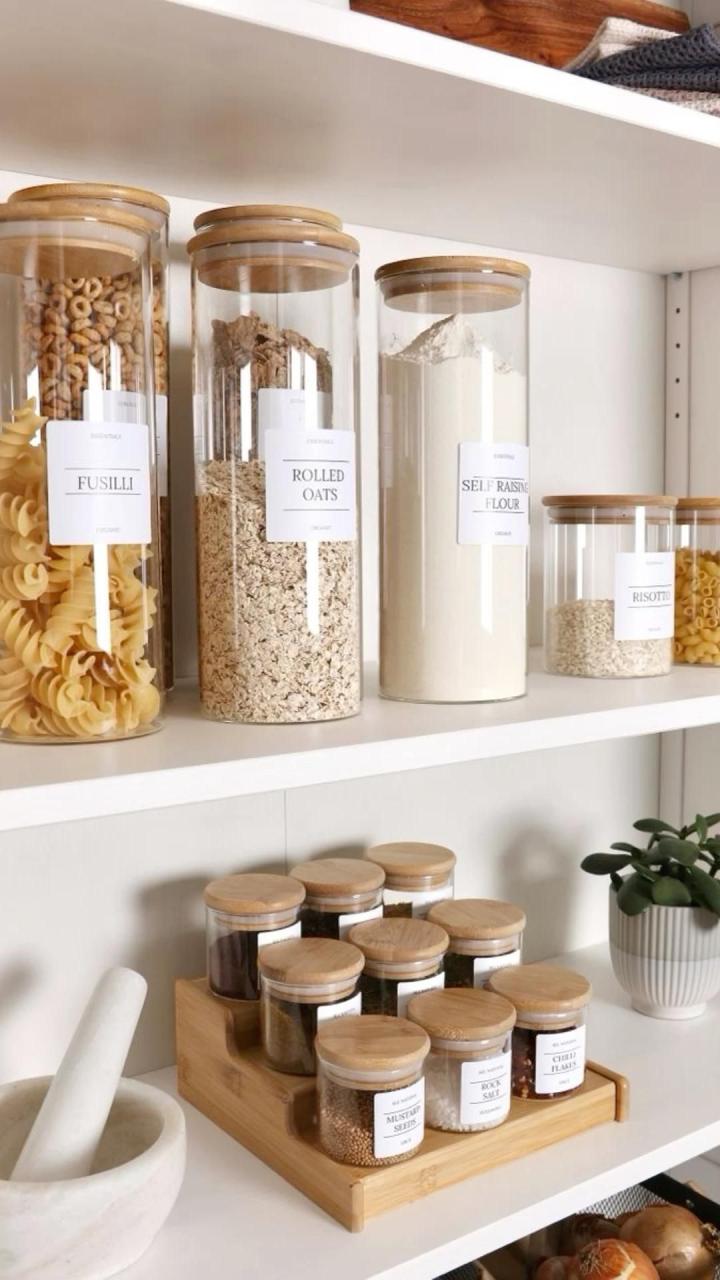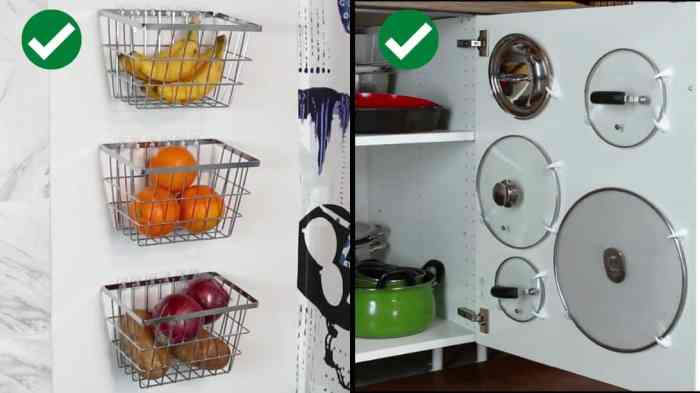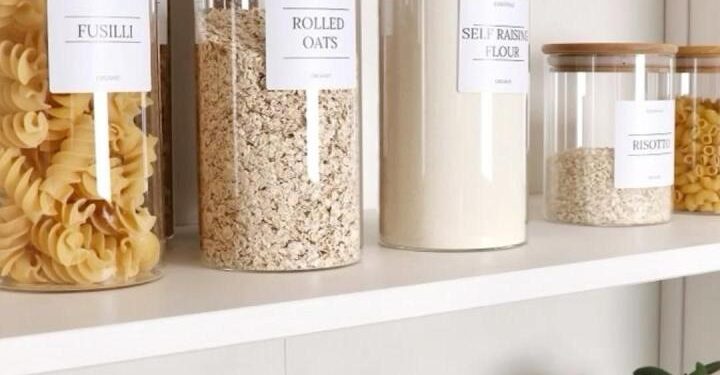With kitchen organization hacks, you can transform your cooking space into a streamlined oasis of efficiency. Say goodbye to cluttered countertops and lost utensils as we explore innovative ways to optimize your kitchen setup. Let's dive into the world of kitchen organization hacks and unlock the secrets to a stress-free culinary experience.

 Meal planning and prep are essential for saving time, staying organized, and maintaining a neat kitchen. By organizing ingredients and meal prep tools, you can streamline the cooking process and make mealtime more efficient.
Meal planning and prep are essential for saving time, staying organized, and maintaining a neat kitchen. By organizing ingredients and meal prep tools, you can streamline the cooking process and make mealtime more efficient.

Introduction to Kitchen Organization Hacks
In today's fast-paced world, having a well-organized kitchen is essential for efficiency and peace of mind. A cluttered and chaotic kitchen can lead to stress and wasted time searching for items.Benefits of Implementing Kitchen Organization Hacks
Implementing kitchen organization hacks can bring a multitude of benefits, including:- Improved Efficiency: A well-organized kitchen allows for easy access to tools, ingredients, and utensils, saving time during meal preparation.
- Reduced Stress: Knowing where everything is located in your kitchen can help reduce stress and create a more calming cooking environment.
- Enhanced Safety: Organizing your kitchen can help prevent accidents caused by clutter or misplaced items.
- Optimized Space: Making the most out of your kitchen space can lead to better functionality and a more enjoyable cooking experience.
Saving Time and Reducing Stress
A well-organized kitchen not only saves time but also reduces stress levels. When everything has its place and is easily accessible, cooking becomes a more enjoyable task. Organizing your kitchen can also help you plan meals efficiently and make grocery shopping easier.Decluttering Techniques
Decluttering your kitchen is essential for effective organization. It involves systematically sorting through items to decide what to keep, donate, or discard. By decluttering before organizing, you create more space and make it easier to find what you need when cooking or preparing meals.Identifying Items to Keep
When decluttering your kitchen, consider keeping items that you use frequently or have sentimental value. Practical items like pots, pans, utensils, and appliances that you use regularly should be prioritized. Sentimental items such as family heirlooms or gifts can also be kept if they hold significance to you.Donating Items
For items that are in good condition but no longer serve a purpose in your kitchen, consider donating them to those in need. This includes duplicate items, appliances you no longer use, or kitchen tools that are still functional but not essential to your daily cooking routine. Donating allows you to declutter while helping others.Discarding Unnecessary Items
Items that are broken, expired, or no longer usable should be discarded. This includes chipped dishes, expired pantry items, and appliances that no longer work. By getting rid of these unnecessary items, you create more space in your kitchen and make room for the things that truly matter.Benefits of Decluttering
Decluttering your kitchen has numerous benefits, including:- Reduced stress and anxiety: A clutter-free kitchen can help you feel more relaxed and focused while cooking.
- Improved efficiency: With less clutter, you can easily find what you need and save time during meal preparation.
- Enhanced safety: Removing unnecessary items reduces the risk of accidents and makes it easier to move around your kitchen.
- Increased enjoyment: A well-organized kitchen can make cooking and mealtime more enjoyable and satisfying.
Storage Solutions
When it comes to organizing a small kitchen, maximizing storage space is key. From creative ideas to utilizing vertical space effectively, here are some tips to help you declutter and make the most out of your cabinets and drawers.Creative Storage Ideas for Small Kitchens
- Utilize the inside of cabinet doors by installing hooks or racks to hang utensils, pot holders, or measuring cups.
- Invest in stackable storage containers or bins to make use of vertical space in your pantry or cabinets.
- Consider using tension rods to create dividers in drawers for organizing baking sheets, cutting boards, or lids.
- Use magnetic strips on the wall to store knives or metal spice containers, freeing up counter or drawer space.
Using Vertical Space for Storage
- Install shelves above countertops or appliances to store items like cookbooks, spice jars, or decorative pieces.
- Hang pots and pans from a ceiling rack or wall-mounted hooks to create more space in cabinets or drawers.
- Utilize a pegboard on the wall to hang kitchen tools or accessories for easy access and to free up drawer space.
- Consider adding a rolling cart with shelves or baskets to store bulky items or appliances that don't fit in cabinets.
Maximizing Cabinet and Drawer Space
- Use drawer organizers or dividers to separate utensils, flatware, or small gadgets for a more organized and efficient space.
- Install pull-out shelves or baskets in lower cabinets to easily access pots, pans, or canned goods without straining to reach the back.
- Utilize stackable shelves or risers to create extra storage space for plates, mugs, or pantry items within cabinets.
- Consider installing under-shelf baskets or hooks to make use of vertical space inside cabinets for storing items like mugs or tea towels.
Organization Tools and Products
When it comes to keeping your kitchen organized, having the right tools and products can make a big difference. Let's explore some essential organization tools every kitchen should have, compare different types of storage containers for organizing pantry items, and discuss the benefits of labeling and categorizing items in the kitchen.Essential Organization Tools
- Drawer organizers: Keep utensils, cutlery, and small gadgets neatly separated in drawers.
- Lazy Susans: Great for corner cabinets to easily access items in the back.
- Over-the-door racks: Utilize vertical space for storing spices, wraps, or cleaning supplies.
Storage Containers for Pantry Items
- Clear plastic bins: Ideal for storing snacks, grains, and baking supplies while keeping everything visible.
- Glass jars: Perfect for storing dry goods like rice, pasta, and beans, creating a uniform look on shelves.
- Baskets or bins: Use these for organizing smaller items like packets, condiments, or snacks.
Benefits of Labeling and Categorizing
- Efficiency: Easily find what you need without rummaging through cluttered spaces.
- Prevent waste: Knowing where everything is helps prevent buying duplicates of items you already have.
- Visual appeal: A well-organized and labeled kitchen not only functions better but looks more inviting.
Meal Planning and Prep Strategies
 Meal planning and prep are essential for saving time, staying organized, and maintaining a neat kitchen. By organizing ingredients and meal prep tools, you can streamline the cooking process and make mealtime more efficient.
Meal planning and prep are essential for saving time, staying organized, and maintaining a neat kitchen. By organizing ingredients and meal prep tools, you can streamline the cooking process and make mealtime more efficient.
Tips for Meal Prepping
- Designate a specific day each week for meal prep to save time during busy weekdays.
- Prepare ingredients in bulk and store them in labeled containers for easy access.
- Utilize versatile ingredients that can be used in multiple recipes to minimize waste.
- Invest in quality storage containers and tools to keep ingredients fresh and organized.
Importance of Meal Planning
- Meal planning helps you make healthier food choices by prepping nutritious meals in advance.
- It prevents last-minute decisions that may lead to ordering takeout or eating unhealthy convenience foods.
- By creating a meal plan, you can create a shopping list and avoid unnecessary trips to the grocery store.
- Organizing your meals in advance can also help you budget effectively and reduce food waste.
Organizing Ingredients and Meal Prep Tools
- Group similar ingredients together in your pantry or fridge for easy access when cooking.
- Label containers and jars to quickly identify items and prevent confusion.
- Keep frequently used tools like cutting boards, knives, and measuring cups in a designated area for convenience.
- Clean and organize your kitchen workspace after each meal prep session to maintain order and efficiency.
Maintenance and Upkeep
Maintaining a well-organized kitchen is essential to ensure functionality, efficiency, and a pleasant cooking experience. By establishing routines and incorporating daily organization tasks, you can keep your kitchen tidy and clutter-free, ultimately saving time and reducing stress. Regular decluttering and reorganization are key to maintaining an organized space and making the most of your kitchen.Daily Organization Tasks
- Start each day by clearing countertops of any items that do not belong, such as mail, keys, or random clutter. This simple task instantly creates a cleaner and more organized space.
- Wipe down surfaces, including countertops, stovetop, and sink, after each use to prevent buildup and maintain a hygienic environment.
- Empty the dishwasher and sink of clean dishes promptly to avoid a pile-up and maintain a functional workspace.
- Sweep or vacuum the kitchen floor daily to remove crumbs and spills, keeping the area clean and inviting.
Importance of Regular Decluttering
Regular decluttering helps prevent accumulation of unnecessary items, making it easier to find what you need and reducing visual chaos in the kitchen.Maintaining a clutter-free kitchen not only enhances the aesthetic appeal but also promotes a sense of calm and order, making meal preparation and cooking more enjoyable. By incorporating these quick daily organization tasks and prioritizing regular decluttering, you can effectively maintain an organized and functional kitchen space.














